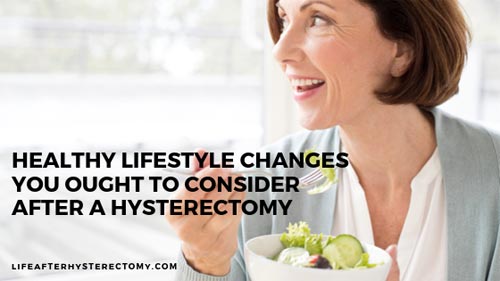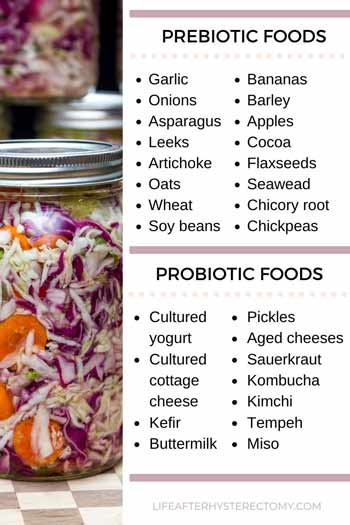Healthy lifestyle changes you ought to consider after hysterectomy
This blog is reader-supported. When you buy through a link on our site, we earn a commission at no extra cost to you. Read more
What are some of the most important healthy lifestyle changes women can and should make after a hysterectomy?

Maintaining a healthy lifestyle is the best way to ward off a hysterectomy’s short- and long-term side effects. Taking care of your health can prevent weight gain, osteoporosis, and pelvic organ prolapse. For some, this can be challenging and involves making certain changes. Living a healthy lifestyle is a combination of healthy eating, regular exercise, healthy weight, and stress management.
How can healthy lifestyle changes be beneficial after a hysterectomy?
- It will help you obtain optimal health
- It improves your quality of life and increases your lifespan
- Your teeth and bones will strengthen, and your skin will look better.
- You will be able to maintain a healthy weight
- It helps to prevent cognitive decline (dementia)
To succeed in making several healthy lifestyle changes after a hysterectomy, check out this list of helpful strategies. Simple changes you can make that provide long-term health benefits after this surgery.
Make healthy food choices
You have to start making healthier food choices after a hysterectomy. This is necessary to prevent weight gain, and in the long run, it will protect you from heart disease. A balanced and nutritious diet with various vegetables, fruits, nuts, and whole grains will help protect your bones (osteoporosis). It will also reduce your chance of developing type 2 diabetes and cancer and possibly fend off Alzheimer’s.
If you have problems with constipation, consider eating more foods that are rich in fiber and drinking plenty of fluids. Chronic constipation will put constant strain on the pelvic floor, which is one of the risk factors for prolapse after hysterectomy.
Take charge of your gut health
The bacteria found in your gut are important for your physical and mental health. New research suggests that gut bacteria may influence your body weight by producing chemicals that affect your appetite and how and where the body absorbs and stores fat.
It appears that non-obese people have 70% more gut bacteria with greater diversity than the ones who are obese.
The worst foods for your gut are processed foods, high in sugar and artificial sweeteners. But also, a diet high in animal protein can be harmful to your gut bacteria.
On the other hand, foods that promote the growth of gut bacteria are whole grains, plant-based foods, prebiotic foods, and probiotic foods.

Break bad eating habits
You may have to stop some bad eating habits to achieve optimal health after your hysterectomy. Many women don’t understand why they are not able to lose weight after a hysterectomy. Often, it’s those bad little habits of ours, like nightly visits to the fridge, snacking all through the day, eating in front of the TV, or reading the news on our smartphone. Try to eat without these distractions and practice what they call mindful eating. Be aware of what you eat, chew properly, don’t fill your plate a second time, and stop when you are full.
If you love junk food and have a hard time motivating yourself to healthier food choices, here is what you should do. Start by reorganizing the fridge. Move all the bad foods out of your eyesight and replace them with fruits, veggies, and healthy snacks. You do the same with your kitchen counters. This way, there will be less temptation to fall back into bad eating habits.
This study reveals that meal planning is associated with food variety, diet quality, and body weight. There are many apps available that can help you set up a meal plan for weight loss. For example, Mealime is a meal planner app that comes with personalized healthy recipes and an organized grocery shopping list.
Get physically active
One of the most important healthy lifestyle changes for women after a hysterectomy is to start a regular exercise routine. There are several good reasons I can give you to remain physically active after a hysterectomy.
To start with, it will stop weight gain after hysterectomy, which is, for many women, an issue after this surgery. Especially, those extra pounds around the waist (belly fat) will increase your risk at risk of diabetes, heart disease, and cancers. The best way to keep a healthy weight is by exercising three or four times a week, preferably with some HIIT, even if it lasts only 15 to 20 minutes.
Secondly, exercises will help to improve your bone health and prevent osteoporosis. Women who have had a hysterectomy are more at risk of bone loss as the lack of estrogen affects bone density. Exercises like lifting weights, aerobics, and yoga can help you strengthen your bones. But also brisk walking, climbing the stairs, and even playing tennis can be helpful in preventing osteoporosis.
Thirdly, exercise can relieve joint pain or menopausal arthritis women may suffer from when they go through surgical menopause.
Lastly, pelvic floor exercises help women maintain a strong pelvic floor. It can protect them from prolapse and urinary incontinence later in life.
Healthy lifestyle changes for your brain
An animal model(with rats)was used to study the effect of uterus removal on brain function. This study reveals that a hysterectomy may affect brain functions such as memory and thinking skills. After a hysterectomy, it helps to constantly challenge your brain to keep it on its toes. Some healthy lifestyle changes for the brain include learning a new skill or language and playing memory games. Physical exercise will also help strengthen your mind as it increases blood flow to the brain and increases the formation of new brain cells.
Healthy lifestyle changes to manage stress and anxiety
Some women are forced into menopause when they remove both ovaries together with the uterus. Changing hormone levels may also affect your emotional well-being. Feelings of guilt, anxiety, anger, and loss are common after a hysterectomy. Often, a few healthy lifestyle changes alone can help to relieve stress and anxiety. Some things that will help alleviate the symptoms that come with stress and anxiety are:
- exercise
- getting sufficient sleep
- meditation
- yoga
Make sure to get enough quality sleep
After your hysterectomy, you may find it difficult to fall asleep at night. Sleep is important for your recovery. Due to fluctuating hormones after a hysterectomy, women are more likely to suffer from stress and anxiety, and this may cause sleep disturbances.
Hot flashes or night sweats often tend to awaken women several times a night, making it difficult for them to stay asleep. For women with chronic sleep deprivation, there is an increased risk of cardiovascular disease, high blood pressure, diabetes, depression, and obesity.
If you want to improve your sleep, you need to avoid heavy meals, coffee, and alcohol near bedtime. Instead, try a bedtime routine with a relaxing bath and a cup of valerian root tea( which has been used for centuries to treat insomnia) before going to bed. I recommend investing in a good mattress and a comfortable cooling pillow.
Vaginal hygiene remains important
Following a hysterectomy, you may go into sudden menopause, and there may be tremendous changes to your vagina. Vaginal blood flow lessens, and reduced estrogen may cause the tissues of the vagina and vulva to become thinner, drier, and less elastic. This can lead to irritation, tearing, and bleeding. Thus, bacterial and yeast infections are more likely to take place.
This also means your intimate zone needs some special care. If you experience internal discomfort during intercourse, a natural water-based lubricant can make sex more enjoyable. You can ask your doctor for a topical estrogen cream to help restore mucosal cells and ease atrophic vaginitis. Some women prefer not to use hormonal creams. For them, Replensh is another option to moisturize the vagina and restore its pH.
How to make healthy lifestyle changes?
Making healthy lifestyle changes alone can be difficult without the help and support of your family. Try to get your spouse to join you in an exercise program or get a friend to join you in a yoga class together.
For some, making healthy lifestyle changes can be intimidating, so it is much easier if you set a goal.
Here are a few tips
- Choose an exercise you like. If you don’t know what type of exercise is right for you, try something new for a short period until you find an exercise that appeals to you, and then you’re more likely to stick with it.
- Make some sort of commitment. Share your plans with the ones close to you so they can remind you of your goals when you are having a difficult moment.
- A plan of action is key. Whether this is for planning meals, exercises, or sleep, you are more likely to set out to succeed by making concrete steps you can follow.
- Focus on one of these changes at the time so you won’t overwhelm yourself.
- Don’t forget to reward yourself when you achieve one of your goals.
- Turn these lifestyle changes into habits and your setup for a better and healthier future.
If you sign up for our newsletter, you can download our FREE FITNESS PLANNER.
Final thoughts
The symptoms of low estrogen levels after hysterectomy are countless as estrogen affects our heart and blood vessels, urinary and reproductive system, bones, the brain, as well as our skin and hair. The uterus provides support for other organs in the pelvis, and removing it can, in some women, cause problems with bowel and bladder function.
Do not wait until a health condition forces you to change your lifestyle. After a hysterectomy, a healthy lifestyle should be a priority. Moreover, it will help to alleviate most of the symptoms related to menopause. Even a few changes can make an enormous difference in your physical and mental well-being for the years to come.
Related posts
- Weight loss plateau: Tips and Tricks to Overcome it
- A Healthy Post Hysterectomy Diet Plan – The Ultimate Guide
- Tips for starting the Keto diet after hysterectomy to lose weight fast
- How to increase metabolism after hysterectomy to get rid of belly fat?
- Healthy lifestyle changes you ought to consider after hysterectomy


Can you perhaps share a home excersise program to do x3 a week. I am now 8 weeks post op and had a Laproscopic, Vagina assisted hysterectomy. I do walk 3km twice a week. I have weights, resistance bands, keto weights and a 3kg weight ball with a big pilates ball.i just want to firm up a bit. I am not trying to loose weight. Thank you as I am so unsure of what can be done.